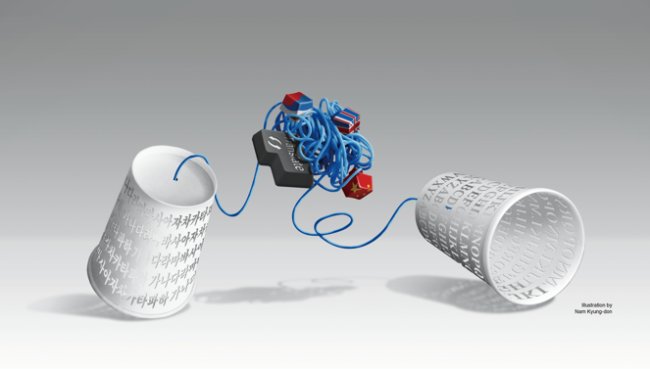Tension filled the room as a senior Seoul official sat at the negotiating table with his U.S. counterparts and a professional interpreter. Seeking to break the ice, he told them a story starting with a Korean proverb.

Word for word, it was supposed to be “Too many boatmen steer a boat to the mountain.” Instead, the interpreter opted for what she believed was a more comprehensible expression, “Too many cooks spoil the broth.” Yet the official, who had expected to hear “ship” or “mountain” to his dismay, gave her poor marks after the session and asked for someone else for the next round.
This old saga, told by a senior diplomat to The Korea Herald, highlights the delicate and complex nature of the work that poses a dilemma between literal and liberal translations, even for the nation’s finest specialists.
Heated debate persists over whether translation is an art or a science. Either oral or written, it requires not just an exceptional command of both languages but also a flair for conveying the nuance and intention of the speaker or writer and, perhaps their audience as well.
Presidential interpreters are some of the best at it, many of them career diplomats armed with superb language skills and knowledge of sensitive foreign policy issues.
“Unlike simultaneous or conference interpretation, we need to embody the speaker’s personality in addition to conveying exact meanings,” said Chung Eui-hae, director for ASEAN cooperation at the Foreign Ministry who served as an English interpreter for late President Roh Moo-hyun from 2006-08.
“Presidential interpreters, in particular, need to help the two leaders build a rapport, going beyond being communication facilitators, while fostering the mood in line with the type of the event.”
The field has increasingly been dominated by women. Females make up some 80 percent of the entire enrollment at the Graduate School of Interpretation and Translation at Hankuk University of Foreign Studies in Seoul, according to school officials.
Yet the overall scale of the market, where freelancing still holds sway, has rather shriveled in recent years, especially for English translation, as more Koreans gain overseas experience starting in childhood and get to mingle with international staff at school and work, insiders say.
“To me, the No. 1 threat to my job security is the growing number of fluent English speakers,” said a freelance English interpreter who served former President Lee Myung-bak and prime ministers under Roh and wishes to remain anonymous.
“Most chiefs of today’s corporations and institutions freely speak English, or they just pick someone from their own pool of capable employees and let them do the job unless the topic is critical and requires a professional.”
The dynamics surrounding the job, traditionally considered the domain of humans, are also rapidly evolving in line with technological innovation.
Some 10 years ago, many Web users enjoyed poking fun at the primitive translations of the Babel Fish service, then run by first-generation search engine AltaVista and now by Yahoo. For an input of “I am Sam,” a Korean translation would pop up, saying “I am a surface-to-air missile,” while the Korean word “woneomin” (“native”) used to be rendered as “circle fisherman” (from “won” and “eomin”).
From Google to Skype to Flitto, however, the once primitive Web-based translation services are now growing smarter, with some now being available even without Internet access, and other gathering wisdom from social media in real time.
Seoul’s Ministry of Science, ICT and Future Planning, for its part, joined forces with the state-run Electronics and Telecommunications Research Institute to roll out an automatic interpretation mobile application named GenieTalk two years ago. Its latest edition unveiled late last year recognizes more than 100,000 words, functions without Internet access and has made Bluetooth communication available.
Yet many industry experts and insiders remain skeptical of the machines’ ability to fully replace career translators, especially given the Korean language’s abstract, subtle, and complex characteristics, though they acknowledge their assistance in boosting accuracy and speed.
“Despite the rapid technological development, in terms of advanced translations and interpretations, machines have yet to overcome their limits due to the ambiguity and duplicity that come with nuanced human speech,” said Kwak Joong-Chol, a professor of interpreting at Hankook University of Foreign Studies.
Cho Sei-young, a former career diplomat and Japanese interpreter for former Presidents Kim Dae-jung and Kim Young-sam and currently an international relations professor at Dongseo University in Busan, echoed Kwak’s view.
“Practical documents such as manuals may be doable with automatic translators. But no cutting-edge computers can be a substitute for creative work like poetry, novels or project planning. A sophisticated task such as summit interpretations will hardly be fulfilled by machines,” he said.
By Shin Hyon-hee (heeshin@heraldcorp.com)

